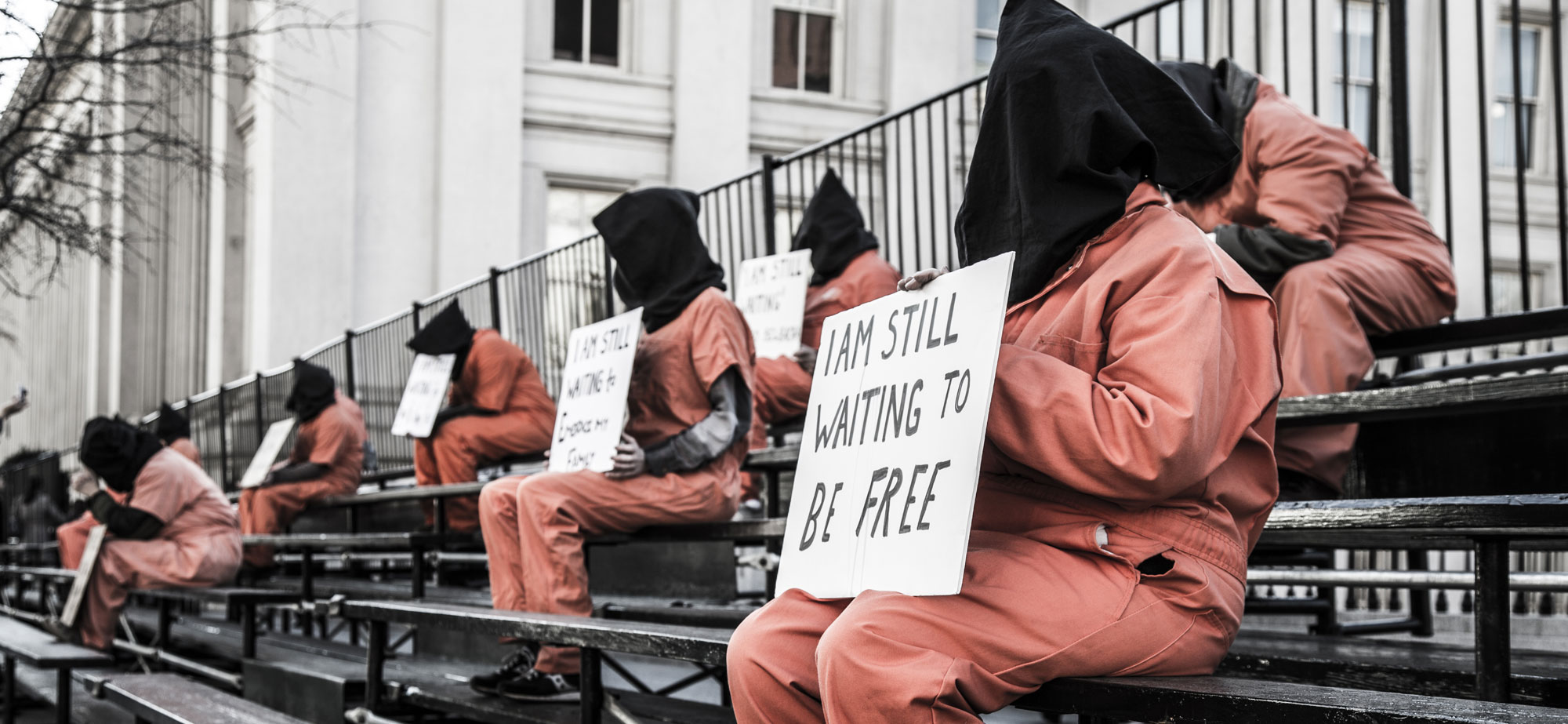From the Archive
Hunger Strike Solidarity Fast: Day 1
Guantánamo prisoner hunger strike day 46
Hello, friends! Love and strength to you all as we come together in spirit this week to be present to our Muslim brothers in Guantánamo. Please take these daily posts — including prisoner writings, activist reflections, and media links — as a way of staying in touch, staying focused, and deepening our commitment to human rights for all.
If you feel moved to contribute a reflection, please send it to chrissy (dot) nesbitt (at) gmail (dot) com.
Is it true (excerpted)
Osama abu Kamir
Jordanian water truck driver
Is it true that one day we will leave Guantánamo bay?
Is it true that one day we will go back to our homes?
I sail in my dreams. I am dreaming of home.
To be with my children each one part of me.
To be with my wife and the ones that I love
To be with my parents, my world’s tenderest hearts.
I dream to be home.
To be free from this cage.
Do you hear me judge? Do you hear me at all?
We are innocent. Here we have committed no crime
Set me Free.
Set us free.
If anywhere still justice and compassion remain in this world.
Who will save the hunger striker?
Amy Nee Walker
“Eternal God…You know that these men have testified falsely against me. Would you let me die, though I am not guilty of all their malicious charges?”
This week the daily mass readings begin with the cry of Susannah, unjustly accused by corrupt officials, sentenced to death in the presence of the people. We read that God hears her. But Susannah is not saved by a bolt of lightning striking down her foes, or by being mysteriously transported to safety. God arouses the Holy Spirit stirring a “young lad,” Daniel, a witness in a crowd of impassive witnesses, and this small person shouts, “I will have no part in the death of this woman!”
People in the crowd are startled. Many had been grieved by the proceedings, but this was out of their hands, the elders, the leaders had decided. Yet here is this stirring, “What did you say?” they ask.
And Daniel says to the people, “Have you become fools, you Israelites, to condemn a daughter of Israel without due process and in the absence of clear evidence?”
In this story, the people respond, turning the tables by turning the accusers over for questioning. It is now they who must prove their case, which they fail to do. So Susannah is delivered, back to her family, and the accusers take her place in receiving the full penalty of the law.
I am struck by how clearly this story illustrates that God moves by moving people. Would this providential delivery have been possible had Daniel not responded to the spirit stirring him to speak? What if the people had not listened? What does all of this mean for us in our time?
Hearing this story for the first time, my thoughts immediately went to an outcry that is currently falling on deaf ears. There are 166 men being held at Guantanamo Bay detention center in Cuba. They are held there without due process, accused in the absence of clear evidence. Their detention is indefinite, a torturous reality. Adding insult to injury, the sacred texts of these men of faith are being tampered with and desecrated, letters from their wives and children are censored or withheld. At Guantanamo, more men have died (9) than have been convicted of a crime (6). The men are experiencing a living death, confined to their tomb until the day that their corpse can be released to their family without fear that it will speak of what it has suffered.
Yet the men there are finding ways to cry out, to God, to their captors, to this crowd of people in the United States, to us. They are using the only tool they have left, their own body, hunger striking. They are not demanding release, only humane treatment, just procedures.
As a woman of faith, I sense the Holy Spirit seeking to arouse a voice in the crowd. We are given the example of Daniel for a reason. God desires compassion and justice and these divine gifts come through people who respond. But what can we do, when the prisoners are not standing directly before us, when the crowd is not crushing about us?
We can still adopt and adapt Daniel’s words, “I will have no part in the death of these men,” “Have we become fools, to condemn men without due process and in the absence of clear evidence?” And we can find the crowds to speak it to, and draw a crowd to speak it with us.
Witness Against Torture (WAT), a group of men and women from across the United States, has been seeking an end to indefinite detention, due process and resettlement for those detained, and the closure of Guantanamo Bay detention center since 2005. Together we are responding to the hunger strikes with tangible actions. Beginning March 24th (Holy Week, for those in the Catholic tradition) we will hold a seven day solidarity fast. Throughout that week we encourage people to call the White House; send letters to the prisoners acknowledging that they have been heard by the public, even if officials have yet to respond; join us for vigils (see witnesstorture.org to find out if there are any happening in your city, or start your own); participate in the fast for a day or more; spread the news in any way you can.
Adnan Latif, a Muslim man who, after eleven years of detention, died at Guantanamo wrote a poignant poem in which he asks, “Who will save the hunger striker?” He died, without ever having been proved guilty of “all their malicious charges.” How many deaths before the cry is heard?
Links for further reading
The work to shut down Guantánamo never ends – Frida Berrigan
Hunger strike photo gallery – MiamiHerald.com
“No Indefinite Detention at Guantánamo,” US Claims, Defying Reality – Andy Worthington
Video: Andy Worthington Discusses the Guantánamo Hunger Strike on Press TV
On the Hunger Strikes of Guantánamo – Independent Voter Network



Join us on social media